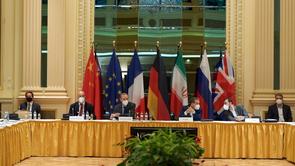 This handout photo taken and released on May 1, 2021 by the EU Delegation in Vienna shows delegation members from the parties to the Iran nuclear deal - Germany, France, Britain, China, Russia and Iran – attending a meeting at the Grand Hotel of Vienna as they try to restore the deal. (PHOTO HANDOUT/ EU DELEGATION IN VIENNA / AFP
This handout photo taken and released on May 1, 2021 by the EU Delegation in Vienna shows delegation members from the parties to the Iran nuclear deal - Germany, France, Britain, China, Russia and Iran – attending a meeting at the Grand Hotel of Vienna as they try to restore the deal. (PHOTO HANDOUT/ EU DELEGATION IN VIENNA / AFP
DUBAI/BERLIN - Iran said on Wednesday the United States had agreed to remove all sanctions on Iran's oil and shipping but Washington said "nothing is agreed until everything is agreed" in talks to revive the 2015 Iran nuclear deal.
The remarks by outgoing President Hassan Rouhani's chief of staff Mahmoud Vaezi echoed previous assertions by officials in Rouhani's pragmatist camp that Washington is ready to make major concessions at the nuclear talks in Vienna that began in April.
The remarks by outgoing President Hassan Rouhani's chief of staff Mahmoud Vaezi echoed previous assertions by officials in Rouhani's pragmatist camp that Washington is ready to make major concessions at the nuclear talks in Vienna that began in April
The indirect talks adjourned on Sunday for consultations in capitals, two days after Iran held a presidential election won by Ebrahim Raisi, the Iranian judiciary chief subject to US sanctions. Raisi is due to replace Rouhani in August.
Iran struck a deal with major powers in 2015 to curb its uranium enrichment program, a possible pathway to nuclear arms, in return for the lifting of US, EU and UN sanctions.
Then-US President Donald Trump abandoned the deal in 2018 and reimposed harsh sanctions, prompting Tehran to start violating some of the nuclear limits in 2019 while sticking to its position that it had no nuclear weapons ambitions.
US President Joe Biden aims to restore the deal, but the sides disagree on which steps need to be taken and when, with the key issues being what nuclear limits Tehran will accept and what sanctions Washington will remove.
ALSO READ: Europeans, US warn Iran nuclear talks won’t be open-ended
"An agreement has been reached to remove all insurance, oil and shipping sanctions that were imposed by Trump," Vaezi was quoted as saying by Iranian state media.
While acknowledging negotiators sometimes draw up draft texts, the US State Department said there would be no agreement until all matters had been resolved.
"During negotiations of this complexity, negotiators try to draft text that capture the main issues, but again, nothing is agreed until everything is agreed," a State Department spokesman said on condition of anonymity.
Echoing Western and Iranian negotiators, German Foreign Minister Heiko Maas said there were still significant hurdles.
"We are making progress but there are still some nuts to crack," Maas told a news conference with US Secretary of State Antony Blinken. Maas said a deal was possible even after the election of Raisi, an implacable critic of the West.
'Difficult Decisions'
French Junior Foreign Minister Franck Riester told lawmakers time was running out to reach a deal and he suggested one might not be struck quickly.
"Difficult decisions will need to be made in the coming days or weeks if these negotiations were not to move forward."
Vaezi also said Iran's Supreme National Security Council would decide whether to extend its nuclear site monitoring deal with the International Atomic Energy Agency after its expiry on June 24.
Iran and the IAEA reached a three-month accord in February to cushion the blow of Tehran's decision - another response to the US withdrawal from the nuclear agreement - to scale back its cooperation with the UN watchdog by ending extra monitoring measures introduced by the 2015 deal.
READ MORE: Iran says documents needed to revive nuclear deal ready
Under the February accord, which on May 24 was extended by a month, data continues to be collected in a black box-type arrangement with the IAEA able to access it only later.


